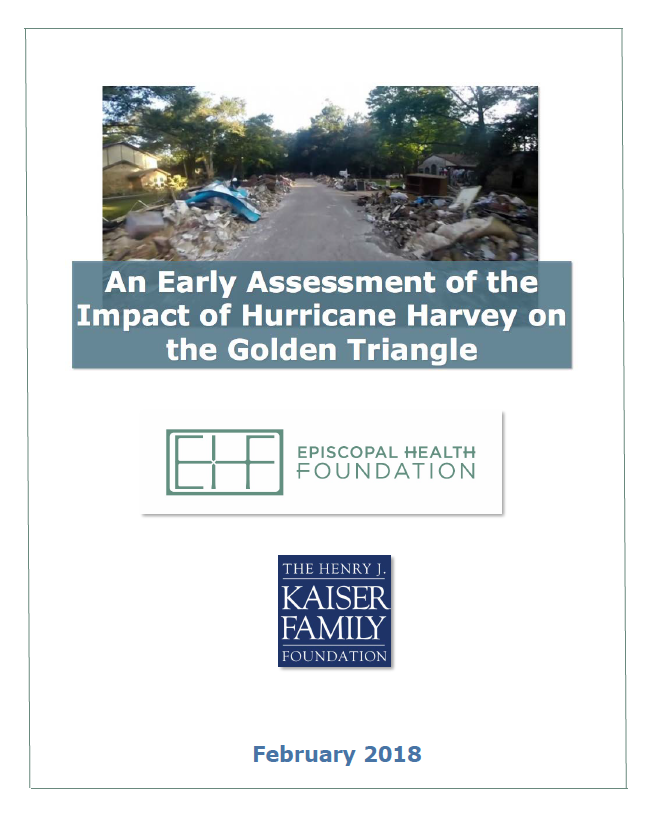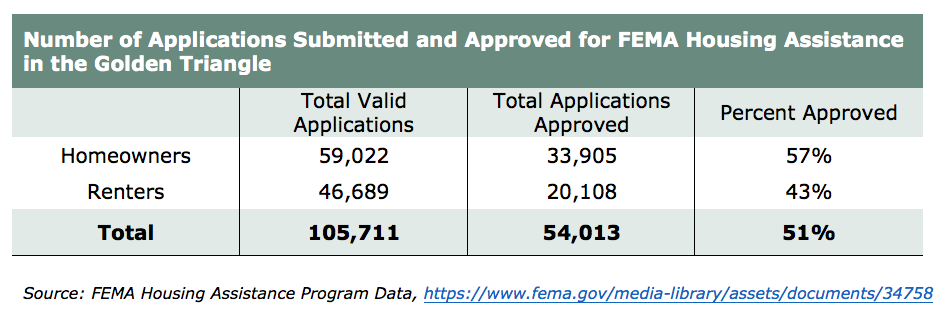 Residents in the Golden Triangle are more likely to have been adversely impacted by Hurricane Harvey than residents in most other regions across the Texas Gulf Coast, finds a comprehensive Episcopal Health Foundation/Kaiser Family Foundation survey of residents in 24 hard-hit counties.
Residents in the Golden Triangle are more likely to have been adversely impacted by Hurricane Harvey than residents in most other regions across the Texas Gulf Coast, finds a comprehensive Episcopal Health Foundation/Kaiser Family Foundation survey of residents in 24 hard-hit counties.
The survey finds about three-quarters (77%) of residents in Jefferson, Hardin and Orange counties report that they suffered property damage, employment disruptions and/or income loss due to Harvey. The survey, taken three months after the storm, also showed that nearly one-quarter (24%) of Golden Triangle residents said that they had not returned home, and six in 10 affected residents (62%) said that their personal situation was still very or somewhat disrupted after Harvey.
In addition, an Episcopal Health Foundation (EHF) analysis of FEMA data released this month shows roughly half (51%) of the applications for FEMA housing assistance by Golden Triangle residents have been approved, with homeowners experiencing a higher approval rate (57%) than renters (43%).
“Six months after the storm, the impacts of Harvey remain a significant challenge across Texas. But those impacts are even more evident in the Golden Triangle,” said Elena Marks, EHF’s president and CEO. “We want government and other recovery funds to use this information to make good decisions about how to reach those most in need with the help they need the most.”
The comprehensive EHF/KFF partnership survey looks at the experiences and views of residents in the Golden Triangle and 21 other counties hardest hit by the storm. The partnership also conducted focus groups in Beaumont as part of the project. Results of the research project have been presented to numerous government agencies and recovery efforts across the region, including Jefferson County commissioners’ court and other groups working in the Golden Triangle.
Survey results show six in 10 residents (62%) in the Golden Triangle experienced home damage, while nearly half (46%) reported that someone in their household experienced income and/or job loss.

FEMA Assistance Approval Rates
An EHF analysis of FEMA data shows the agency received 105,711 applications for disaster assistance from households in Jefferson, Hardin and Orange counties. That number represents roughly 70% of the total households in the area, according to government census records. EHF’s analysis finds that about half (51%) of the applications for housing assistance were approved.

“We don’t know all the specific reasons for approvals or denials, but the numbers across Texas show many lower-income communities were less likely to be approved for FEMA assistance than some of the higher-income communities,” said Marks. “Recovery efforts need to use this kind of data to not only best decide where assistance should go, but also what diverse types of help may be needed in different communities.”
For example, Marks says lower-income neighborhoods may need more specific assistance in filing appeals to FEMA decisions or applying for other government and philanthropic recovery programs.
Recovery Needs & Priorities
When asked about the help they personally need to recovery from Harvey, the survey finds that about half (52%) of Golden Triangle residents who were affected by the storm said they needed help to repair damage to their homes. One-quarter of affected residents said they needed help finding affordable permanent housing.
In addition, large majorities of residents say community-wide priorities should include getting financial help to the people who need it (73%), making more affordable permanent housing available (71%), rebuilding destroyed homes (70%) and making temporary housing available to those who need it (70%).